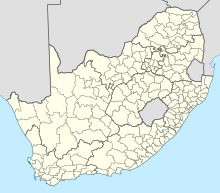Mismanagement, inefficiency and discontent
In rural areas South African municipalities are generally in a poor and deteriorating financial state, [4] a situation which affects business activity and risks, livelihoods and growth propects of the economy. Businesses and their insurers have expressed concern that business assets in rural municipalities are not insurable. [5]
Discontent with the service delivery of municipalities is evident from the rising number of protests recorded from 2004 to 2020. The number of major protests increased from only 10 in 2004, to 237 in 2018. [6] By 2019–20 Gauteng province had the most service delivery protests (some 23%), followed by KwaZulu-Natal (c.21%), the Western Cape (c.20%), Eastern Cape (c.15%) and Mpumalanga (c.9%). Discontent often revolves around the demand for housing and free basic services, especially when community members are displaced or suffer the loss of income. Other causes are perceived councillor accountability, the quality or pace of basic service delivery (housing, water and electricity), [7] misappropriation of COVID-19 relief benefits and land invasions. [6] Protestors sometimes confuse issues relating to land demarcation, political candidates, or employer disputes with local government's service delivery mandate. When violent, protests may impinge on freedom of movement or property of others. [6] [7]
Some of South Africa's municipalities are drowning in debt due to corruption and lack of skills, [8] and by 2020 a significant proportion found themselves financially and logistically stressed by the pandemic. [6] Municipalities often employ unqualified personnel [9] who are unable to deliver proper financial and performance governance, which in addition leads to fraud, irregular expenditure (R30 billion in 2017, and R25 billion in 2018) and consequence-free misconduct. [10] Only a fraction (14% in 2017, 8% in 2018) of municipalities submit clean annual audits to the Auditor-General, and implementation of the AG's recommendations has been lax. By 2018, 45% of municipalities have not implemented all procedures for reporting and investigating transgressions or fraud, while 74% were found to insufficiently follow up on such allegations. [10] The late Kimi Makwetu suggested holding employees individually accountable, treating recommendations as binding and issuing a certificate of debt to guilty parties.
In 2022 it was revealed that almost all municipalities have aging and dysfunctional water infrastructure. The Department of Water and Sanitation stated that poor maintenance and operations caused an average 40% (26%-60%) of water to be lost before it reached end users. [11] As of 2020, municipalities owed South Africa's Water Boards a total of R12 billion, and a culture of non-payment had taken hold. [12] They had also accumulated debt of R46.1 billion (R31 billion overdue) with Eskom. [13]
Emfuleni Municipality's unserviced debt with Eskom (over R2.3 billion by 2020 [14] ) and Rand Water (some R1,1 billion [15] ) prevented it from providing a reliable power and water supply, [16] which affected its ability to collect levies and taxes. A 2018 High Court judgment allowed Eskom to seize R645 million worth of Emfuleni's fixed assets due to non-payment for electricity. [14] Lekwa Municipality has been taken to court by businesses around Standerton for failing to provide clean and sufficient water and electricity. These service interruptions were due to its soaring debt to Eskom (R1.1 billion by 2020 [17] ), and its non-payment for services provided by the Department of Water and Sanitation. In 2018 VBS Bank collapsed, affecting the deposits of 14 municipalities. These deposits, which were all illegal in terms of the Municipal Finance Management Act (MFMA), included a R245 million deposit by Fetakgomo Tubatse Municipality, and a R161 million deposit by Giyani Municipality. [18]
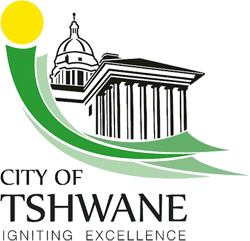
The City of Tshwane Metropolitan Municipality, also known as the City of Tshwane, is the metropolitan municipality that forms the local government of northern Gauteng in South Africa. The metropolitan area is centred on the city of Pretoria with surrounding towns and localities included in the local government area.
Eskom Hld SOC Ltd or Eskom (Afrikaans: Elektrisiteitsvoorsieningskommissie) is a South African electricity public utility. Eskom was established in 1923 as the Electricity Supply Commission (ESCOM). Eskom represents South Africa in the Southern African Power Pool. The utility is the largest producer of electricity in Africa, and was among the top utilities in the world in terms of generation capacity and sales. It is the largest of South Africa's state owned enterprises. Eskom operates a number of notable power stations, including Matimba Power Station and Medupi Power Station in Lephalale, Kusile Power Station in Witbank, Kendal Power Station, and Koeberg Nuclear Power Station in the Western Cape Province, the only nuclear power plant in Africa.

The City of Johannesburg Metropolitan Municipality is a metropolitan municipality that manages the local governance of Johannesburg, the largest city in South Africa. It is divided into several branches and departments in order to expedite services for the city. Zulu is the most spoken home language at 23.4% followed by English at 20.1%.
In South Africa, a metropolitan municipality or Category A municipality is a municipality which executes all the functions of local government for a city or conurbation. This is by contrast to areas which are primarily rural, where the local government is divided into district municipalities and local municipalities.
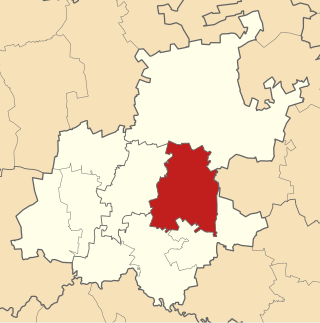
The City of Ekurhuleni Metropolitan Municipality is a metropolitan municipality that forms the local government of the East Rand region of Gauteng, a large suburban region east of Johannesburg. Ekurhuleni means "place of peace" in XiTsonga. Ekurhuleni is one of the five districts of Gauteng and one of the eight metropolitan municipalities of South Africa. The seat of Ekurhuleni is Germiston and the most spoken language is Zulu at 28.6%. The city is home to South Africa's busiest airport, OR Tambo International Airport, which is in the Kempton Park area of Ekurhuleni.

The City of Cape Town is the local government of Cape Town and surrounding areas. As of the 2016 community survey, it had a population of 4,005,016.

Municipal elections were held in South Africa on 1 March 2006, to elect members to the local governing councils in the municipalities of South Africa. The municipalities form the local government of South Africa and are subdivisions of the provinces, thus making them responsible for local service delivery, such as electricity, water and fire services.
The nine provinces of South Africa are divided into 52 districts, which are either metropolitan or district municipalities. They are the second level of administrative division, below the provinces and above the local municipalities.
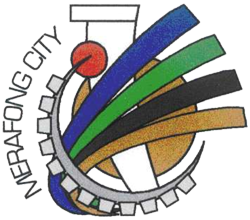
Merafong City Municipality is a local municipality in the West Rand District Municipality, in the Gauteng province of South Africa. Its boundaries encloses some of the richest gold mines in the world. It is situated about 65 km from Johannesburg and is serviced by a number of major roads, including the N12 from Johannesburg to Beaufort West and the N14.

Emfuleni Municipality is a local municipality within the Sedibeng District Municipality, in the Gauteng province of South Africa. It is the westernmost local municipality in the district, and covers an area of 987 km2 at the heart of the Vaal Triangle. It is located in the former industrial heartland of Gauteng which created employment and wealth for Sebokeng, Vanderbijlpark, Vereeniging, Three Rivers and Sharpeville. Its head offices are located at the corner of Klasie Havenga St and Frikkie Meyer Blvd, Vanderbijlpark. The municipality was founded in 1999.
South Africa has been dubbed "the protest capital of the world", with one of the highest rates of public protests in the world.

Mogale City Local Municipality is a local municipality within the West Rand District Municipality, in the Gauteng province of South Africa.

Lekwa Municipality is a local municipality situated in the southwest of the Gert Sibande District Municipality, in the Mpumalanga province of South Africa. Standerton, an urban node, is the seat of the municipality. It was inaugurated on 5 December 2000 after the amalgamation of the Standerton, Sakhile and Morgenzon councils. Agriculture, forestry and fishing constitute about 30% of its economy. It is situated on open grassland plains of the Highveld region, which is traversed by the west-flowing Vaal River, for which it is named. Lekwa is the Sesotho name for the Vaal River. Lekwa's first two decades were marked by increasing maladministration, which culminated in a collapse in governance and service delivery by 2020. This had negative consequences for its residents and businesses, the environment, and utilities which were not paid for their services.
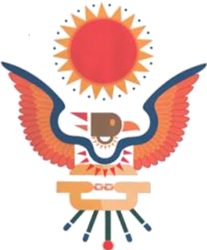
Maluti-a-Phofung Municipality is a local municipality within the Thabo Mofutsanyane District Municipality, in the Free State province of South Africa. It encompasses substantially all of the former bantustan of QwaQwa, except for the small enclave at Botshabelo. The population is almost entirely Basotho. The municipality is named after the Drakensberg mountains. The peak is known as the Sentinel, which is called Phofung in Sesotho.

Intsika Yethu Municipality is a local municipality within the Chris Hani District Municipality, in the Eastern Cape province of South Africa. The municipality is one of the six local municipality in this district. Intsika Yethu is an isiXhosa word meaning "our pillars".

The Twelfth Amendment of the Constitution of South Africa altered the boundaries of seven of South Africa's nine provinces. It also redefined all of the provinces' geographical areas in terms of the areas of district and metropolitan municipalities, and repealed the provisions introduced by the Third Amendment that allowed municipal areas to cross provincial boundaries. A number of the boundary changes were highly controversial and led to popular protest and court challenges.
The 2016 South African municipal elections were held on 3 August 2016, to elect councils for all district, metropolitan and local municipalities in each of the country's nine provinces. It was the fifth municipal election held in South Africa since the end of apartheid in 1994; municipal elections are held every five years.
A transitional representative council is a local administrative division in South Africa. Between 1994 and 2000 it was the default type of municipal government for small and rural communities. After apartheid these transitional councils were created as a provisional local representation until the formation of a more final municipal structure. Due to the implementation of a municipal system in 2000, all – except one – transitional councils were abolished and their areas were merged into new municipalities.
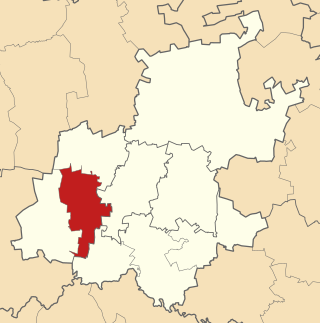
Rand West City Municipality is a local municipality in the Gauteng province of South Africa. It was established after the August 2016 local elections by merging the Randfontein and Westonaria local municipalities. It is a division of the West Rand District Municipality.

The 2021 South African municipal elections were held on 1 November 2021, to elect councils for all district, metropolitan and local municipalities in each of the country's nine provinces. It is the sixth municipal election held in South Africa since the end of apartheid in 1994, held every five years. The previous municipal elections were held in 2016. On 21 April 2021, President Cyril Ramaphosa announced that the elections will be held on Wednesday, 27 October 2021. It had been recommend by Dikgang Moseneke to delay the municipal elections until 2022. The Electoral Commission of South Africa (IEC) requested the Constitutional Court to support the date postponement. The Economic Freedom Fighters (EFF) supported the date postponement while the Democratic Alliance (DA) was against the postponement of the date. The Constitutional Court dismissed the application to postpone the date until 2022, ruling that they had to take place between 27 October and 1 November. On 9 September 2021, the Minister of Cooperative Governance and Traditional Affairs, Nkosazana Dlamini-Zuma announced that the elections would be held on 1 November.

